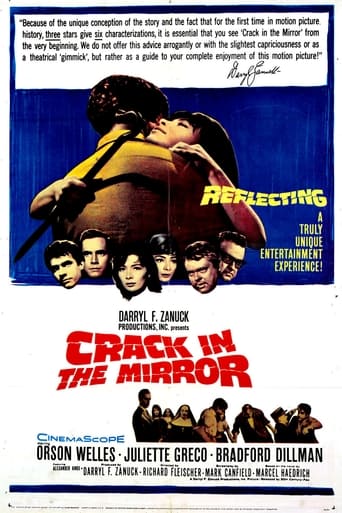Edgar Soberon Torchia
An interesting complex attempt to tell two stories with similar problems and motivations and with the same faces, in different milieus and economic standings, within the frame of a crime melodrama, which also touches aspects of social climbing and professional advancement. What I feel "Crack in the Mirror" lacks is the impact of the crime itself: although a couple of times women react with disgust at the description of the details, we the spectators need that visual representation of the murder and mutilation of the victim to believe it is truly a sensational case for the press. Times have changed very much since the days Aeschylus, Sophocles or Euripides spared the audiences the ugly aspects of the plot of Greek tragedies. With violence being part of their daily life, people want graphic representations of crimes. The story is sensual enough and it is quite explicit and daring for 1960, but the authors preferred to go for a chauvinistic final reflection on old men being replaced by ruthless women who want younger lovers. All three leads have little space to develop their characters, and the film belongs to Dillman and Greco who do not have Welles' histrionic scope to cover all the emotional range of the two parts each plays. Although it is very hard to find, it is worth a look.
JohnHowardReid
A gimmick movie. One of the reasons that it doesn't wholly succeed is that two of the leads, namely Juliette Greco and Bradford Dillman, are rather wet, especially the latter. Multiplying their roles by two is NOT an improvement. At least Orson Welles is only on-screen in both his roles for a very short time, but he so grossly overacts the low-life character that he destroys most of his credibility. Fortunately, in the final scenes, especially in his last speech to the court, Welles delivers his dialogue with a ring of sincerity that compels attention. However, another problem with the movie is there are some super-dull patches in the script which I'm surprised were not jettisoned by the editor. These scenes were not necessary for continuity. They were just plain boring. Another problem less capable of remedy is that apart from three or four inspirational flashes and his effective use of locations, Fleischer's direction is rather dull. Maurice Jarre's over-insistent music score doesn't help either.
dbdumonteil
Although not always successful,"crack in the mirror" which is despised in France where the action takes place (it's one of the flaws of the movie: why locate the action there and make the viewer believe he is in Paris by using some words here and there :"Monsieur Le Président" "Monsieur Le Commissaire" "Monsieur Le Juge" and so on?)is in need of reassessment Richard Fleischer was always a brilliant thrillers maker .Many of his works are models of the genre,and during his whole career (if we except his dismal last decade ,roughly the years following "Solyent green" ):"the clay pigeon","trapped" and "follow me quietly" are early ;"compulsion" and "crack" are middle period ; "The Boston strangler" and " 10 Rillington Place are late (and perhaps his most brilliant achievements in the field).I would not place "crack" as high as the others though.But this is a bizarre intriguing movie,which does not look like any other movie.Perhaps the two stories told in parallel (and played by the three same leads,which was not common at the time ) are there to hide the banal side of the subject (man/woman/lover triangle) ,but there are stunning flashes of inspiration:the mirrors which appear with the cast and credits;Lawyer Orson Welles entering the room where the old man was slain ,where the movie almost verges on the fantasy and horror genre -not unlike that scene in "follow me quietly " when the dummy comes alive" ;the same lawyer ,pleaing against the accused woman (and double crossing his colleague who was his wife's lover),his voice sounding like God's ;this sequence also mirrors the final of "compulsion" ,his precedent (and superior effort)where Welles plays a similar part.The fact that Bradford Dillman appears in both movies too adds to this strange similarity.Juliette Greco is the only French artist of the whole movie (unless some -very- supporting actors count);she was primarily a Chanteuse,but oddly ,when she sings a love songs in front of the nuns/wardens ,she does not sound at all like she does when she sings in French;a question of language maybe;or maybe she was dubbed for the part of the working -class woman for I only recognize her voice when she portrays the bourgeois lady.
sdiner82
One of the outstanding--albeit forgotten--films of the early 1960s, CRACK IN THE MIRROR is a sizzling, frankly sexual, twist-filled drama with Orson Welles, Juliette Greco and Bradford giving the performances of their careers. (Make that the "two" performances of their careers!) In the first story, lower-class lovers Ms. Greco and Dillman are so in lust that they plan an intricate murder to rid themselves of Ms. Greco's dull husband, Mr. Welles. Now here's the twist. When they are put on trial for manslaughter, the distinguished judge is portrayed by Mr. Welles. And unbeknownst to him, a fellow detective (Mr. Dillman) and Mr. Welles' wife, the lustrous Ms. Greco, are also in heat and plotting to do away with him. To say anything more about this highly original, superbly-acted thriller would do it a disservice. Just SEE it, and savor three actors at their best (under Richard Fleicher's brilliant direction) in a film long-overdue for the praise it deserved some 40 years ago. Rating: ****


